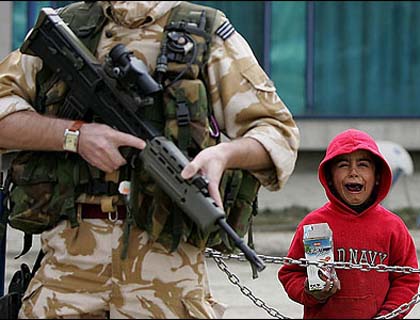The 2001 September 11 terrorist attacks on the US saw a US “War on Terror” and George Bush tried to link Saddam Hussein to Osama Bin Laden and Anti Government Elements, responsible for the attacks. This link was never proved, for these two were fundamentally opposed in ideology. Nonetheless, the US continued to raise reasons why Iraq needed to be targeted. Despite all the promises, the U.S. has wrecked rather than reconstructed Iraqi society, and from the beginning of its occupation, it stoked a civil war between Sunni and Shiite Muslims that has now taken hold and is wreaking horrific damage. With the overthrow of the Shah of Iran in 1979, the U.S. turned to Saddam Hussein’s Baathist regime as a pivotal ally in the region. It supported Iraq in its 1980s war against Iran that killed over a million Iraqis and Iranians, and left Iraq’s economy in shambles.
As the bombing campaign ended and Saddam Hussein was overthrown, the expected quick democracy, peace, and gratitude to the US quickly became a nightmare and disaster as major religious and ethnic factions started fighting each other and the US/UK occupation forces. The civilian death toll has been immense. The Iraq war is a global predicament of the first order and its resolution will influence the course of events in the Middle East and beyond for a considerable time. What we are witnessing in Iraq is the beginning of the unraveling of the unjust and unstable system that was carved out of the wreckage of the Ottoman Empire. It had held for nearly 100 years by a mixture of foreign occupation, outside meddling, brutal dictatorships and minority rule. At the same time, it signally failed in providing a permanent sense of legitimacy to its power, engaged its citizens in their governance, or provided a modicum of well-being and a decent standard of existence for its people.
The first Bush administration launched the 1991 Gulf War, driving Iraq out of Kuwait. The Gulf War, destroyed much of Iraq’s infrastructure and killed an estimated 300,000 people, but Saddam Hussein regime didn’t fall. The U.S. feared that Iran might take advantage of a power vacuum, so it stood by as Hussein and the Baathists massacred hundreds of thousands people who rose up after the war. Terror attacks were occurring almost every day in numerous cities in Iraq. Oil exports were crippled by sabotage of the pipelines and storage facilities. On a single day, over 100 people, mostly Iraqis were killed in a series of coordinated attacks. The attacks caused disgust even among leaders, who denounced those who killed civilians. The installation of the new government did not cause abatement in terror attacks. On the contrary, blasts killed Iraqi police and police trainees as well as US military personnel almost every day.
Foreign personnel were frequently kidnapped and held for ransom or in order to force their governments to leave the coalition forces or to induce their employers to leave Iraq. Several such hostages were beheaded and their beheadings shown on videotape. Instead, Anti Government Elements in Iraq today is taking more power as everyday blast and killing of civilians indicate. Individual Anti Government Elements cells persist, in steadily shrinking areas of the country, but they can longer mount the sort of coherent operations across Iraq that had become the norm in 2006. The elimination of key leaders and experts has led to a significant reduction in the effectiveness of the Al-Qaeda bombings that did occur, hence the steady and dramatic declines in overall casualty rates but as the Arab spring started the old Iraq started showing it picture and dozens of civilians are being killed with the passage of every day. By 2006 it was evident even to the US administration that the Iraq war effort was in trouble. The Iraqi government had not implemented most of the reforms agreed with the US.
The incidence of violence and suicide bombings was rising. Outside factors, especially Syria, Iran and al-Qaeda were implicated in the violence. The war in Iraq has become a major generator of advertising revenue for these corporations, so there is no incentive to actually report the truth, but rather manipulate the fiction. It requires genuine vision and statesmanship to pull the Middle East from its death spiral.
The elements of a possible solution are there if the will exists to postulate an alternative to the politics of fear, bigotry and hatred. There is a long struggle ahead in Iraq, in Afghanistan, and elsewhere against Al Qaeda and its allies in extremism. We can still lose. American forces and Afghan allies defeated Al Qaeda in Afghanistan in 2001 as completely as defeated them in Iraq. But mistakes and a lack of commitment by United States and its allies in Iraq by withdrawing its forces from there have allowed a resurgence of terrorism in Afghanistan. And now as Afghanistan is not secure enough and Taliban and its allies are getting strength and attacking major attacked wherever they want throughout Afghanistan, the United States and the NATO forces to which we handed off responsibility are withdrawing forces next year. The same mistake should be repeated in Afghanistan as it happened in Iraq where the stakes are so much higher. America must not try to pocket the success we have achieved in Afghanistan and declare a premature and meaningless victory. Instead, let us be heartened by success. We have avoided for the moment a terrible danger and created a dramatic opportunity.

